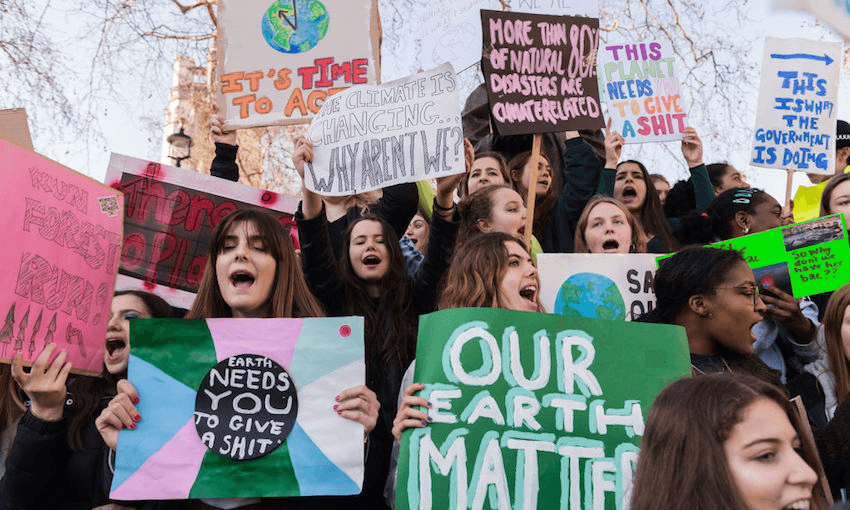Covering Climate Now: Carys Goodwin reflects on giving up, and what convinced her to take up the fight again.
The Spinoff’s participation in Covering Climate Now is made possible thanks to Spinoff Members. Join us here!
Four years ago, while working for the Green Party in parliament, I did a brief stint as the climate change adviser. Part of my job was pitching stories to various media outlets – trying to get anything climate-related over the line and into the newsphere. It was incredibly difficult.
No one really wanted climate stories – they were boring, and stale, and technical. No one wanted to hear about poor international climate finance contributions or then-abstract worries of impending doom. Outlets would pick things up if it was a slow day, or if there was a particularly punchy headline.
As you can imagine, seeing the depth and breadth of the coverage this week has been thrilling, vindicating. But it has also made me indescribably furious.
I left parliament almost a year after being an adviser, to restart my life overseas and detach myself from the personal, cloying world of New Zealand politics (which I often thought reminiscent of a muggy Auckland evening or a nightmare where you’re naked on Courtenay Place and every single person is someone you’ve seen at a BYO). When I reached my new home – England – I started to look into local political groups, green groups; something to give my “activist” identity a home. I didn’t join anything. I couldn’t. Working on climate change throughout university and a brief, early career had left me dry. I was worn out. I was too sad.
Instead, I focused on the academic side of the problem. On trees. Burying myself in the world of understanding why we think about nature the way we do, and of how landscapes and geographies are part of who we are, and of the ugly genealogy we can trace between colonial decisions made “then” and our mistreatment of the environment “now”.
Partway through my research, I went to a UNFCCC COP (United Nations Framework Convention on Climate Change Conference of the Parties) in Marrakech. Despite getting accreditation through my university, I fell in with a group of Kiwis I knew or half knew from my old climate change scene, as Kiwis are prone to do. I followed them to panels, or NZ stakeholder debriefs; an honorary part of the group even though I had little business lumping myself in with the work they were doing. The Kiwis I spent time with in Marrakech were an inspiring group of young people; the sort I still stalk on social media and feel proud of when I see they’re fighting the good fight.
But being at COP was something else that made me furious.
My experience in Marrakech was one of opposites. By day I was in a blazer, stifled, aimlessly trying to rescue a research project that was spiralling out of my control, so frustrated with the lack of progress from both myself and from the diplomats that I felt near-constantly on the verge of tears. But by night I was weaving my way through the medina passageways, buying kilograms of dates I had no room for, avoiding the gaze of tourist-trappers and ducking into kaleidoscopic markets, driving around in a new local friend’s car at two in the morning, staring wide-eyed at the city walls cast against the inky sky and feeling indescribably lucky that by happenstance of geography my spiralling research took me to such a brilliant city.
Climate change is a thing of opposites too. For years the dominant discourse has been technical. We heard it through the frame of carbon trading and credits, and emissions reductions, and adaptive capacity. Very rarely about the people, very rarely doing justice to the scale of the challenges we’re now facing.
This is changing. The Guardian’s recent article detailing why it’s giving up “climate change” in favour of “climate crisis”, “biodiversity” in favour of “wildlife”. Stuff referring to its participation in Covering Climate Now as “atonement”. The sheer number of editorials declaring dedication to writing truthfully about our new reality.
Now, finally, climate change is being written about with the urgency it has always needed. About the floods, the fires, the hurricanes, the mass migrations, the war, the complete and utter devastation that is facing our planet sooner, and sooner, and sooner.
It should have been like this the entire time. From the moment we knew. Our story could have been so different – a tale of restored forests, and cities made for real people, and nature creeping into our lives and bringing such joy and delight that it would be unfathomable to think we could’ve ever let it die off because of our own negligence and greed.
Like day and night. Opposite worlds.
So, of course, part of me is indescribably furious.
In a way, though, I’m glad that I’m furious. It’s a feeling of passion and outrage that slipped away as I let the fatigue of working on such an enormous challenge seep in. After Marrakech, the last vestiges of the “activist” part of myself, the part I built an identity around, fell dormant. It was too hard. I finished my dissertation, I stopped going to protests. I leant in on the very-millennial humour that meant making jokes about burning or drowning in casual conversation. I cultivated a new life for myself where I wasn’t “green Carys”, or “climate change Carys”, I was just Carys.
I gave up.
(God, I hope I can forgive myself for that in the years to come.)
There’s a new generation of furious young people now. Young people skipping school to march on the streets, standing up to the condescending middle-aged men who’ve never been more wrong about anything, fighting with such intensity that I feel absurd pride for hundreds of thousands of kids I’ve never met.
We can’t let them burn out. We can’t let them fade off into a sheltered world of academia instead of taking over the world. We can’t let them sit at their computers, at half one on a work night on the other side of the world, and type feverishly about anger, and remorse, and grief, and having given up.
The scale of the climate crisis is here, now. We’re being shown it in more depth and detail than I could’ve imagined four years go. More people are on the streets and screaming than at any point before, ever.
We can still have part of the world we can imagine – restorative nature, and rivers brimming with life, and cities resilient to powerful storms, and landscapes living and breathing, and justice for all who’ve suffered for our arrogance. The opposite world to the one we’re on track for.
Standing in the wake of all the young people who’ve inspired me – before, and now; friends and strangers – that’s something I think I’m ready to fight for again.
The Spinoff’s participation in Covering Climate Now is made possible thanks to the contributions of Spinoff Members. Join The Spinoff Members to help us do more important journalism.



